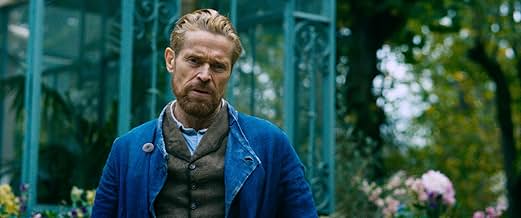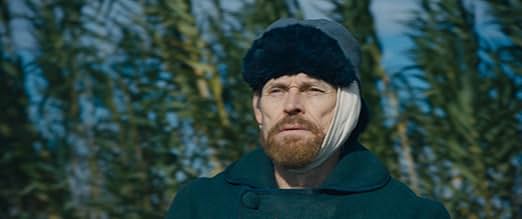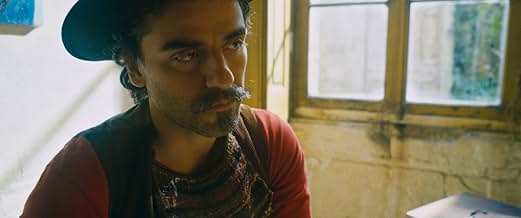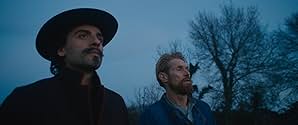Ein Blick auf den Teil des Lebens des Malers Vincent van Gogh, in dem er in Arles und Auvers-sur-Oise (Frankreich) lebte.Ein Blick auf den Teil des Lebens des Malers Vincent van Gogh, in dem er in Arles und Auvers-sur-Oise (Frankreich) lebte.Ein Blick auf den Teil des Lebens des Malers Vincent van Gogh, in dem er in Arles und Auvers-sur-Oise (Frankreich) lebte.
- Regie
- Drehbuch
- Hauptbesetzung
- Für 1 Oscar nominiert
- 3 Gewinne & 16 Nominierungen insgesamt
Clément Paul Lhuaire
- Emile Bernard
- (as Clément Lhuaire)
Alan Aubert
- Albert Aurier
- (as Alan Aubert-Carlin)
- …
Empfohlene Bewertungen
AT ETERNITY'S GATE is by no stretch meant to be a pure biography of Van Gogh. I think you need to already be familiar with some of the outlines of his story and it would help to be an appreciator of his work already. What we're really seeing here is director Julian Schnabel's attempt to show us the world as seen through the eyes of Van Gogh. How did he see things and what inspired him. What drove him to madness? What frustrated him in his relations with people? How did he slip into madness (if, indeed, he did)?
Hence, there are a lot of shots of scenery seen through Van Gogh's eyes. I don't know if star Willem Dafoe had a go-pro strapped to his head, or what...but we see walking feet, we see the ground, then the sky, then the landscape...over and over. We see him painting. We see him sitting still and contemplating the land around him. If you can give yourself over to this, it is fairly effective. Instead of wondering when something will happen, just try to experience what you're seeing and hearing. You may be drawn into seeing how Van Gogh saw beauty in the rough landscape around him and how he could NOT stop from painting it in a fever of wanting to catch it before it slipped away. At the same time, these scenes teeter on the edge of tedium.
There are more conventional scenes, to be sure. We see interactions between Van Gogh and Paul Gaughin (Oscar Isaac) and an extensive conversation between Van Gogh and a priest (the excellent Mads Mikkelsen). However, these scenes are full of characters talking about how they see art and the world around them...they speak to each other in lectures. So, the dialogue is not convincing...but it IS interesting. Again, I think it may help to already be interested in Van Gogh.
Scenes with Vincent and his brother Theo (Rupert Friend) are more poignant and personal, along with his interactions with the villagers around him. We see his awkwardness with people and yet feel his need to connect. We get a sense of his crushing poverty. (By the way, Dafoe is WAY too old to be playing this part...but his unusual face actually seems right for the role. No doubt Van Gogh would have been weary and weathered at the end of his life. Dafoe, overall, is pretty darn good here.)
It's an effective movie in many regards, but I tried hard to let myself be completely swept away by it and couldn't quite escape my impatience from time to time.
(I will say that if I were an art teacher; this would be a great film to show my college class. Study the bio of Van Gogh from a textbook, and then show this film. I've never seen a better attempt to put the viewer into the mind, or even psyche, of a great painter. It's a very noble, worthwhile effort. Very much for art lovers, or those wishing to be.)
Hence, there are a lot of shots of scenery seen through Van Gogh's eyes. I don't know if star Willem Dafoe had a go-pro strapped to his head, or what...but we see walking feet, we see the ground, then the sky, then the landscape...over and over. We see him painting. We see him sitting still and contemplating the land around him. If you can give yourself over to this, it is fairly effective. Instead of wondering when something will happen, just try to experience what you're seeing and hearing. You may be drawn into seeing how Van Gogh saw beauty in the rough landscape around him and how he could NOT stop from painting it in a fever of wanting to catch it before it slipped away. At the same time, these scenes teeter on the edge of tedium.
There are more conventional scenes, to be sure. We see interactions between Van Gogh and Paul Gaughin (Oscar Isaac) and an extensive conversation between Van Gogh and a priest (the excellent Mads Mikkelsen). However, these scenes are full of characters talking about how they see art and the world around them...they speak to each other in lectures. So, the dialogue is not convincing...but it IS interesting. Again, I think it may help to already be interested in Van Gogh.
Scenes with Vincent and his brother Theo (Rupert Friend) are more poignant and personal, along with his interactions with the villagers around him. We see his awkwardness with people and yet feel his need to connect. We get a sense of his crushing poverty. (By the way, Dafoe is WAY too old to be playing this part...but his unusual face actually seems right for the role. No doubt Van Gogh would have been weary and weathered at the end of his life. Dafoe, overall, is pretty darn good here.)
It's an effective movie in many regards, but I tried hard to let myself be completely swept away by it and couldn't quite escape my impatience from time to time.
(I will say that if I were an art teacher; this would be a great film to show my college class. Study the bio of Van Gogh from a textbook, and then show this film. I've never seen a better attempt to put the viewer into the mind, or even psyche, of a great painter. It's a very noble, worthwhile effort. Very much for art lovers, or those wishing to be.)
Vincent Van Gogh was a tortured soul that was, paradoxically, obsessed with beauty and wonder. Julian Schnabel (director) tries to give us a glimpse into the mind of the painter with this film and he delivers. This movie is not a biopic. It is more of an homage, an attempt to make us look at the world the way Vincent did.
With a dynamic camera, often hand-held, we wander around with Van Gogh (Willem Dafoe) trying to find interesting and striking images of nature, villages, people... The camera is always searching; different lenses, different angels, different distances... It finds new and inventive ways of filming. For example the split diopter is used, not to bring two objects into focus, but to blur par of the screen; and since Vincent had an eye condition, we are truly put in the artists shoes. Such a shame the movie at times loses itself in its eager to find yet another camera angle.
Sometimes a voice-over paints another image on top of what is shown. The score paints an atmosphere of ecstasy with a darker undertone. And Willem Dafoe paints an A+ performance, but he does it so well other actors sometimes disappear into his shadow.
Yet, this movie is an experience worth exploring. However it's tempo occasionally falters and instead of one long smooth stroke over the canvas, it sometimes feels more like a rough patchwork of different stories. It's sometimes messy, sometimes incredibly beautiful. Quite like Van Gogh.
This movie is not for everyone. Those who shiver when encountering vague, artsy-fartsy movies that call themselves art, better turn elsewhere. But those who can appreciate this way of filming and especially those who love Van Gogh's work, will adore this dreamlike exploration of Vincent's mind.
With a dynamic camera, often hand-held, we wander around with Van Gogh (Willem Dafoe) trying to find interesting and striking images of nature, villages, people... The camera is always searching; different lenses, different angels, different distances... It finds new and inventive ways of filming. For example the split diopter is used, not to bring two objects into focus, but to blur par of the screen; and since Vincent had an eye condition, we are truly put in the artists shoes. Such a shame the movie at times loses itself in its eager to find yet another camera angle.
Sometimes a voice-over paints another image on top of what is shown. The score paints an atmosphere of ecstasy with a darker undertone. And Willem Dafoe paints an A+ performance, but he does it so well other actors sometimes disappear into his shadow.
Yet, this movie is an experience worth exploring. However it's tempo occasionally falters and instead of one long smooth stroke over the canvas, it sometimes feels more like a rough patchwork of different stories. It's sometimes messy, sometimes incredibly beautiful. Quite like Van Gogh.
This movie is not for everyone. Those who shiver when encountering vague, artsy-fartsy movies that call themselves art, better turn elsewhere. But those who can appreciate this way of filming and especially those who love Van Gogh's work, will adore this dreamlike exploration of Vincent's mind.
This film tackles the story of an artist creating masterpieces for later generations but not for his own. All the techniques that bothered other reviewers--the handheld camera, loud piano soundtrack, looped dialog--all emphasized a life of loneliness and ridicule that made the audience experience those emotions.
Clearly the story lacked a typical plot, not so much because it wasn't there as much as that Van Gogh's story is so well known and portrayed. I sensed that my companions may have been wishing they had chosen a different movie but for me this film further added to the tapestry of Van Gogh's unique story. Plus the film addresses the two biggest points of contention about him ... his ear and his death ... and suggests that Van Gogh's character traits have turned those into unsolvable mysteries.
Clearly the story lacked a typical plot, not so much because it wasn't there as much as that Van Gogh's story is so well known and portrayed. I sensed that my companions may have been wishing they had chosen a different movie but for me this film further added to the tapestry of Van Gogh's unique story. Plus the film addresses the two biggest points of contention about him ... his ear and his death ... and suggests that Van Gogh's character traits have turned those into unsolvable mysteries.
Loved the raw hand held camera work . The director shows the scene in such a that u can really enter into vincent's mind and can see his vision . Obviously the acting of Willem Dafoe was tremendous and he took the character to another level .
This film succeeds in various ways: Dafoe delivers a marvelous portrayal of van Gogh, and Rupert Friend offers a dignified performance as Theo, his brother. The production design, costuming, and lush landscapes are all outstanding. As someone who has seen most of the films directed by Schnabel, I find him an insightful, astute director, yet I wish he would have introduced more nuance into certain scenes.
The invigorating piano score suffers from an overblown volume at various times. At the pre-release screening, more than a handful of people walked out of the film, midway. I think they were overwhelmed by a dizzy combination of loud music and jumpy, blurred camera techniques. As for me, the approach worked, adding a visceral punch.
Some of the dialogue was culled from Vincent's letters to his brother, and Dafoe rendered the text with a vulnerable immediacy. Several roles were aptly cast, but could have benefited from additional screen time: Isaac (as Gauguin), Almaric (Dr. Gachet), and Seigner (Madame Ginoux).
The invigorating piano score suffers from an overblown volume at various times. At the pre-release screening, more than a handful of people walked out of the film, midway. I think they were overwhelmed by a dizzy combination of loud music and jumpy, blurred camera techniques. As for me, the approach worked, adding a visceral punch.
Some of the dialogue was culled from Vincent's letters to his brother, and Dafoe rendered the text with a vulnerable immediacy. Several roles were aptly cast, but could have benefited from additional screen time: Isaac (as Gauguin), Almaric (Dr. Gachet), and Seigner (Madame Ginoux).
Wusstest du schon
- WissenswertesWillem Dafoe was 62 when the film was released, 25 years older than Vincent van Gogh, who died at age 37.
- PatzerTheo tells Vincent at the hospital that he is now married. In reality Vincent received a letter from his brother on Dec 23rd 1888, in which he announced his engagement. Vincent feared that his brother would not be able to support him, once married. Additional to this he had the argument with Gaugin that night over Paul leaving. Mentally disturbed by all this he cut his ear off.
- Zitate
Vincent Van Gogh: Maybe God made me a painter for people who aren't born yet.
Priest: Possibly.
Vincent Van Gogh: It is said, Life is for sowing. The harvest is not here.
- Crazy CreditsThere's a mid-credits scene, where a Paul Gauguin quote is narrated.
- VerbindungenFeatured in Sven Uslings Bio: 2019 Års sämsta biofilmer (2020)
Top-Auswahl
Melde dich zum Bewerten an und greife auf die Watchlist für personalisierte Empfehlungen zu.
- How long is At Eternity's Gate?Powered by Alexa
Details
- Erscheinungsdatum
- Herkunftsländer
- Offizielle Standorte
- Sprachen
- Auch bekannt als
- Van Gogh en la puerta de la eternidad
- Drehorte
- Produktionsfirmen
- Weitere beteiligte Unternehmen bei IMDbPro anzeigen
Box Office
- Bruttoertrag in den USA und Kanada
- 2.294.915 $
- Eröffnungswochenende in den USA und in Kanada
- 92.856 $
- 18. Nov. 2018
- Weltweiter Bruttoertrag
- 11.519.666 $
- Laufzeit
- 1 Std. 51 Min.(111 min)
- Farbe
- Seitenverhältnis
- 2.35 : 1
Zu dieser Seite beitragen
Bearbeitung vorschlagen oder fehlenden Inhalt hinzufügen
























